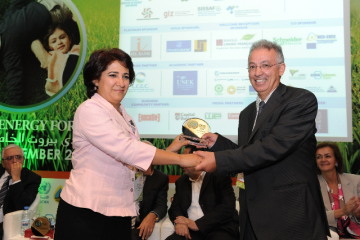
Within the context of the 5th Beirut Energy Forum, ESCWA organized a session entitled "The Role of Renewable Energy in Socio–Economic Development in the Arab Region" on 17 September 2014. The session, which was moderated by Moncef Ben Abdallah, Senior Energy Expert, and former Tunisian Industry and Energy Minister, tackled the impact of sustainable energy transition on youth unemployment and job creation opportunities; the impact of Renewable Energy (RE) and Energy Efficiency (EE) deployment; and the role of Small and Medium Enterprises (SMEs) in this matter. The opening ceremony of the Forum included the announcement of recipients of the "Energy Ambassador Awards", whereby Roula Majdalani, Director of ESCWA Sustainable Development Policies Divisions (SDPD), an active contributor to the advancement of sustainable development in the region and Lebanon, was selected as recipient of the Beirut Energy Forum's Energy Ambassador Awards, in the "Lebanese Individual" category for the year 2014. The winning candidates in the other three categories were respectively: Khatib & Alami; Central Bank of Lebanon; and Schneider Electric. The session of ESCWA revolved around three major themes as follows: Potential for RE in the Manufacturing Sector, presented by Giovanna Ceglie, Director and Representative of the UN Industrial Development Organization (UNIDO) regional office in Cairo; the Impact of Scaling up Renewable Energy Deployment on Employment, Particularly in Rural Areas, presented by Diala Hawila, representing the Abu Dhabi-based International Renewable Energy Agency (IRENA); and the Role of SMEs in Promoting RE and EE Utilization, presented by Ulrike Lehr, Head of RE Department at Gesellschaft für Wirtschaftliche Strukturforschung (GWS) in Germany. Discussions highlighted the importance of encouraging off-grid applications of renewable energy to help advance electrification and socio-economic development objectives in rural areas, and setting-up platforms to exchange experience between stakeholders in developing and implementing RE policy, and in reducing barriers facing renewable energy. Regarding energy efficiency, participants noted that facing the multi-faceted and diverse barriers, effective policy solutions will need to address the respective features of individual energy service markets and the multiple barriers to energy efficiency within each. They also highlighted the importance of cooperation and exchange of experiences and best practices, as well as enrolling RE and EE aspects in the different stages of education.





